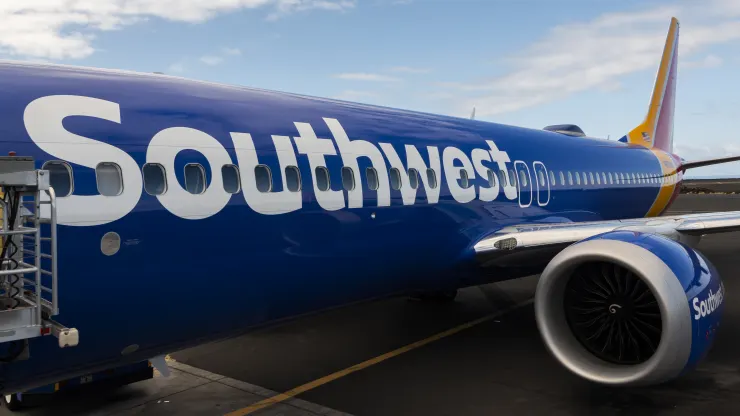A Southwest Airlines jet is parked Ellison Onizuka Kona International Airport at Kehole awaiting passengers on January 20, 2024 in Kailua-Kona, Hawaii
Southwest Airlines has taken a decisive step by adopting a shareholder rights plan, commonly known as a “poison pill,” to thwart activist investor Elliott Management’s efforts. Elliott, which owns approximately 11% of Southwest, is pushing to remove CEO Bob Jordan and Chairman Gary Kelly.
Shareholder Rights Plan Activation
The poison pill will be triggered if Elliott or another investor acquires at least 12.5% of the company. If this threshold is crossed, all other shareholders will have the right to purchase an additional Southwest share at a 50% discount for every share they own. This move aims to dilute Elliott’s influence and voting power.
Southwest’s stock gained 1% following the announcement. Other major U.S. airlines also saw an uptick in their shares. Elliott revealed in June that it had accumulated a $1.9 billion stake in Southwest, criticizing the airline’s performance compared to larger rivals offering premium seating options.
Elliott Management’s Ambitions
Elliott’s actions included making HSR (Hart-Scott-Rodino Antitrust Improvements Act) filings, signaling intentions to potentially increase its stake. These filings require a 30-day waiting period, suggesting Elliott began this process around the time it disclosed its stake.
“Southwest Airlines has made a good faith effort to engage constructively with Elliott Investment Management since its initial investment and remains open to any ideas for lasting value creation,” Kelly stated. Despite the board’s backing of the current leadership, Elliott’s campaign remains a significant challenge.
Challenges and Strategic Shifts
Southwest has faced numerous challenges, including an oversupplied domestic market and delays in receiving new planes from Boeing. Elliott’s investment has added pressure on the airline to boost revenue. Southwest is considering substantial changes to its long-standing business model, such as introducing seating assignments and premium seating options.
Historically, Southwest has been highly profitable, standing out in an industry characterized by volatility. However, recent struggles have prompted reevaluation and potential strategic shifts.
Activist Hedge Fund’s Track Record
Elliott Management, one of the most successful hedge funds globally, manages over $65 billion in assets. The firm has a track record of mounting activist campaigns at companies like AT&T, Salesforce, and Texas Instruments. Elliott moved its headquarters from New York to West Palm Beach, Florida, in 2020 and has only experienced two losing years in its five-decade history.
Southwest has enlisted Bank of America and Morgan Stanley as its bankers, along with law firms Vinson & Elkins and Kirkland & Ellis, known for their expertise in activism defense. Despite the tensions, Southwest’s management continues to explore avenues for value creation while maintaining open communication with Elliott.
Elliott Management has yet to respond to requests for comment on the recent developments. The ongoing situation underscores the complexities of balancing activist investor pressures with strategic corporate governance.
#SouthwestAirlines #ElliottManagement #CorporateNews #ShareholderRights #PoisonPill
